
MYCORRHIZA
Scope & Guideline
Unveiling the Secrets of Mycorrhizal Networks
Introduction
Aims and Scopes
- Investigation of Mycorrhizal Diversity:
Research in this area emphasizes the diversity of arbuscular and ectomycorrhizal fungi, studying their community structures, ecological interactions, and functional traits that influence plant health and nutrient acquisition. - Impact of Environmental Factors on Mycorrhizal Relationships:
Studies often explore how factors such as soil type, nutrient availability, and climate change affect the dynamics and effectiveness of mycorrhizal associations, providing insights into their adaptive strategies. - Molecular and Physiological Mechanisms:
The journal includes research on the molecular mechanisms underlying mycorrhizal symbiosis, including gene expression, metabolic pathways, and the physiological responses of host plants to mycorrhizal colonization. - Applications in Agriculture and Conservation:
The journal highlights studies that assess the practical applications of mycorrhizal fungi in agriculture, such as improving crop resilience and productivity, as well as their role in ecosystem restoration and biodiversity conservation. - Interactions with Other Soil Microorganisms:
Research on the interactions between mycorrhizal fungi and other soil microorganisms, including bacteria and nematodes, is a significant focus, exploring how these relationships affect plant health and soil ecology.
Trending and Emerging
- Host-Specific Mycorrhizal Interactions:
A growing number of studies focus on host-specific interactions between plants and mycorrhizal fungi, revealing how different plant species select and benefit from distinct fungal partners, which is crucial for understanding ecosystem dynamics. - Mycorrhizal Responses to Environmental Stressors:
Research is increasingly examining how mycorrhizal fungi help plants cope with abiotic stressors such as drought, salinity, and heavy metal contamination, showcasing their potential role in sustainable agriculture under changing environmental conditions. - Functional Traits of Mycorrhizal Fungi:
Emerging studies are investigating the functional traits of mycorrhizal fungi, including their ability to enhance nutrient uptake and improve soil structure, which is vital for optimizing their use in agricultural practices. - Molecular Tools for Mycorrhizal Research:
There is an increasing trend in the application of molecular techniques, such as environmental DNA and transcriptomics, to study mycorrhizal communities and their interactions at a more detailed level, facilitating advanced research methodologies. - Mycoheterotrophy and Symbiotic Relationships:
Research on mycoheterotrophic plants and their specialized relationships with mycorrhizal fungi is gaining traction, reflecting an interest in the complexity of these interactions and their ecological implications.
Declining or Waning
- Historical Perspectives on Mycorrhizal Research:
Research papers that provide historical overviews or retrospective analyses of mycorrhizal studies have decreased, suggesting a shift towards more contemporary and applied research. - Generalized Studies on Mycorrhizal Effects:
There has been a waning interest in broad studies that merely describe mycorrhizal effects without delving into specific mechanisms or contextual applications, as the field moves towards more specialized investigations. - Taxonomic Studies without Ecological Context:
Research focused solely on the taxonomy of mycorrhizal fungi, without exploring their ecological roles or interactions, appears to be losing prominence, as the field emphasizes functional insights.
Similar Journals
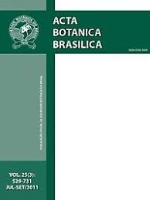
Acta Botanica Brasilica
Advancing Plant Science Through Open AccessActa Botanica Brasilica is a prestigious open-access journal dedicated to the field of botany and plant science, published by SOC BOTANICA BRASIL. With an ISSN of 0102-3306 and E-ISSN of 1677-941X, it has been a vital resource for the academic community since its inception in 1987, fostering the dissemination of research and knowledge related to plant biology and ecology. Hailing from Brazil, the journal serves as a platform for researchers to share valuable insights on plant species, their habitats, and important ecological interactions. As of 2023, the journal holds a Q3 ranking in Plant Science and is recognized within the Scopus database, where it ranks #263 out of 516, placing it in the 49th percentile among its peers. This broad accessibility and commitment to quality research make Acta Botanica Brasilica an essential publication for botanists, ecologists, and other professionals in the life sciences, bridging gaps in knowledge and advancing the field with original articles, reviews, and comprehensive research findings.
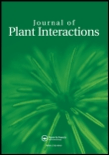
Journal of Plant Interactions
Advancing the Science of Plant InteractionsThe Journal of Plant Interactions, published by Taylor & Francis Ltd in the United Kingdom, serves as a leading open-access platform dedicated to advancing the understanding of plant interactions and their ecological implications. Established in 2005 and transitioning to open access in 2015, this journal focuses on both fundamental and applied aspects of plant interactions, providing invaluable insights for researchers, professionals, and students within the fields of Ecology and Plant Science. With a commendable impact factor and ranked in the second quartile (Q2) for both Ecology, Evolution, Behavior and Systematics and Plant Science, it reflects the quality and relevance of its published research. Researchers aiming to publish innovative studies on plant behavior and ecosystem dynamics will find a welcoming avenue for their work, as the journal is dedicated to fostering open dialogue and sharing knowledge across disciplines.
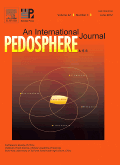
PEDOSPHERE
Pioneering Insights into Soil EcosystemsPEDOSPHERE, published by SCIENCE PRESS, is a leading journal in the field of Soil Science, holding a prestigious position in the Q1 category as per the latest evaluations, reflecting its high impact and relevance in the domain. Established in 1996, this journal is committed to advancing our understanding of soil-related processes and their interactions with various environmental components, providing a platform for innovative and high-quality research. With an impressive rank of #13 out of 159 in the Scopus classifications for Agricultural and Biological Sciences, PEDOSPHERE reaches the 92nd percentile, indicating its significance among scholarly publications. Although the journal operates under traditional access options, it remains an essential resource for researchers, professionals, and students keen on exploring the complexities of soil dynamics and sustainability. By bridging interdisciplinary methodologies and fostering collaboration, PEDOSPHERE plays a vital role in addressing global challenges related to soil management, conservation, and ecological balance.

Soil Ecology Letters
Innovating Research for a Greener FutureSoil Ecology Letters, published by SpringerNature, is a premier journal dedicated to advancing the knowledge and understanding of soil ecosystems, their functions, and their vital role in global sustainability. Since its inception in 2019, this leading journal has consistently maintained its prestigious Q1 ranking in Ecology, Evolution, Behavior and Systematics, as well as Soil Science, reflecting its significant impact in the ecological and environmental sciences community. With an impressive Scopus ranking that places it within the top percentile of journals in its field, Soil Ecology Letters provides a platform for researchers and professionals to disseminate their groundbreaking findings. The journal is a vital resource for advancing research in agricultural and biological sciences, offering open access options that promote widespread dissemination of knowledge. With its focus on fostering collaboration and innovation in soil ecology, this journal is essential reading for anyone aiming to deepen their understanding of soil environments and their critical role in ecological health.
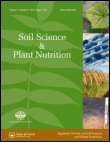
SOIL SCIENCE AND PLANT NUTRITION
Advancing sustainable practices for a greener tomorrow.SOIL SCIENCE AND PLANT NUTRITION, published by Taylor & Francis Ltd, stands as a prominent journal in the fields of plant science and soil science, with its impact reflected in its Q2 ranking across both categories in 2023. Established in 1955, this journal provides a vital platform for researchers, professionals, and students dedicated to understanding the complex interactions between soil and plant nutrition, with an emphasis on advancing sustainable agricultural practices. With an impressive Scopus ranking, placing it in the 75th percentile for Plant Science and the 71st for Soil Science, it attracts high-quality, peer-reviewed articles that contribute significantly to the body of knowledge in these disciplines. While the journal does not currently offer Open Access options, its comprehensive scope encompasses studies from fundamental research to applied science, making it an essential resource for anyone engaged in soil management, agronomy, or related fields.
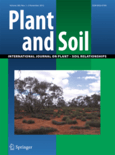
PLANT AND SOIL
Connecting scholars to enrich the fields of Plant and Soil Science.PLANT AND SOIL is a prestigious academic journal that has been at the forefront of plant and soil research since its inception in 1948. Published by SPRINGER in the Netherlands, this journal has carved a niche as a leading source of high-quality, peer-reviewed articles, which are essential for researchers, professionals, and students in the fields of Plant Science and Soil Science. With an impressive impact factor placing it in the Q1 category of both disciplines, it ranks 50th in the field of Plant Science and 24th in Soil Science, highlighting its influence in the scientific community. Although not available as open access, the journal provides a wealth of knowledge and insights into the interactions between plants and soils, exploring critical topics such as soil health, crop productivity, and sustainable agriculture practices. Researchers who wish to contribute to this vital area of study through their empirical findings will find PLANT AND SOIL to be an invaluable platform for disseminating their work and connecting with a network of leading scholars committed to advancing our understanding of these essential ecosystems.

Folia Oecologica
Exploring the Intersection of Ecology and Agriculture.Folia Oecologica is a distinguished open-access journal published by WALTER DE GRUYTER GMBH, focusing on critical research in the fields of agricultural and biological sciences, ecology, and forestry. Established as a vital platform for the dissemination of knowledge, this journal has been providing free access to its valuable content since 2017, catering to an international audience engaged in environmental and ecological studies. With its ISSN 1336-5266 and E-ISSN 1338-7014, Folia Oecologica has earned notable ranks in Scopus, placing it in the 62nd percentile for Agricultural and Biological Sciences and the 50th percentile for Environmental Science. The journal's commitment to high-quality research is reflected in its positions in the Q2 and Q3 quartiles across various categories in 2023. As it converges years from 2006 to 2024, Folia Oecologica continues to foster scholarly dialogue and collaboration among researchers, professionals, and students, making significant contributions to the understanding and preservation of our ecological systems.
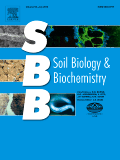
SOIL BIOLOGY & BIOCHEMISTRY
Innovating Insights into Soil BiochemistrySOIL BIOLOGY & BIOCHEMISTRY, published by Pergamon-Elsevier Science Ltd, is a premier academic journal that plays a pivotal role in advancing the fields of microbiology and soil science. Established in 1969, this esteemed journal has gained recognition for its rigorous publication standards and impactful research contributions, evidenced by its prestigious Q1 rankings in both Microbiology and Soil Science categories for 2023. With an impressive Scopus rank of #3 among 159 in Agricultural and Biological Sciences and #14 among 182 in Immunology and Microbiology, it boasts a notable 98th percentile in its field. The journal offers researchers, professionals, and students a vital platform for sharing innovative studies and insights about soil ecosystems and their biochemical processes, fostering greater understanding and collaboration within the scientific community. While Open Access options are currently not available, the journal remains a cornerstone for those seeking to deepen their knowledge and contribute significantly to soil biology and biochemistry.

Journal of Fungi
Advancing Mycology Through Open Access ResearchJournal of Fungi is a premier open-access journal published by MDPI, dedicated to advancing the understanding of fungal biology in its myriad forms. Since its inception in 2015, it has become a vital resource in the fields of ecology, evolution, and plant sciences, attaining notable rankings in Scopus, including Q1 status in Ecology, Evolution, Behavior and Systematics, and Plant Science, with a Q2 ranking in Microbiology (medical). The journal fosters a collaborative platform for researchers, professionals, and students by providing unrestricted access to high-quality, peer-reviewed articles, which encourages the dissemination of innovative findings and methodologies relevant to fungal research. Designed to cater to a global audience, the Journal of Fungi has established its significance in the scientific community, especially from its base in Switzerland, where it continues to contribute to the ongoing discourse in mycology and beyond. With its commitment to open access since its launch and its continuous support for groundbreaking research, the journal plays a crucial role in driving forward the scientific inquiry and ecological awareness in fungal studies.

Ecologies
Advancing ecological understanding for a sustainable future.Ecologies is a dynamic open-access journal published by MDPI, based in Switzerland, which focuses on the interdisciplinary study of ecological and environmental sciences. Since its inception in 2020, the journal has made significant strides in contributing to our understanding of complex ecological interactions, evolutionary processes, and the implications of biological diversity on ecosystem functionality. With its categorization in Q2 for Ecology and various Q3 rankings in related fields, it proudly offers a platform for innovative research that aims to address pressing ecological challenges. Researchers, professionals, and students can benefit from its comprehensive and insightful articles that are freely accessible, ensuring that critical findings are disseminated widely to facilitate informed decision-making and foster collaboration across disciplines. With the impact of climate change and biodiversity loss at the forefront of global discussions, Ecologies plays a pivotal role in shaping the future of ecological research and policy implementation.